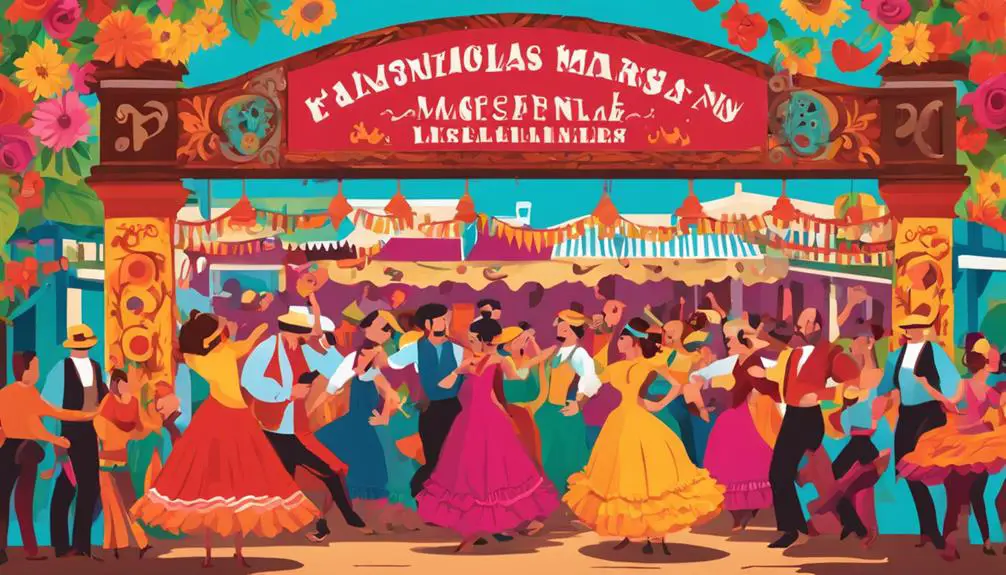You're about to uncover the secret to sounding like a native Spanish speaker. Mastering local slang, idioms, and expressions will take your language skills to the next level. From country-specific phrases like "hacer puente" to regional dialects that reflect each area's unique cultural identity, you'll learn to navigate everyday conversations, foodie adventures, and nightlife like a local. You'll even discover the vibrant lexicon of love and relationships in Spanish slang. As you explore the world of Spanish slang, you'll find that cultural nuances and authentic connections are just around the corner, waiting to be revealed.
Slang Essentials for Travelers

When traveling to Spain, you'll likely encounter a plethora of slang expressions that can enhance or hinder your interactions with locals. Mastering these phrases can be the key to exploring a deeper level of cultural immersion and avoiding language barriers.
As you navigate the streets of Madrid or Barcelona, being able to understand and use colloquialisms can make all the difference in building connections with the people you meet.
To truly experience the essence of Spanish culture, it's crucial to move beyond textbook Spanish and dive into the world of slang. By doing so, you'll be able to communicate more effectively and show respect for the local culture. However, be warned: using the wrong phrase or tone can have the opposite effect, leading to confusion or even offense.
Country-Specific Lingo You Need
Two essential country-specific slang phrases to learn for Spain are 'hacer puente' and 'tomar el pelo'. You'll often hear these phrases in everyday conversations, and understanding them will help you better connect with locals.
'Hacer puente' literally means 'to make a bridge', but it's used to describe taking a long weekend by taking Friday off and making a four-day weekend.
On the other hand, 'tomar el pelo' means 'to take someone's hair', but it's actually used to describe when someone is teasing or pulling your leg.
Mastering these phrases will give you insight into the cultural nuances of Spain. You'll be able to participate in conversations and understand the local humor.
Language evolution is a natural process, and being aware of these phrases will help you navigate the complexities of the Spanish language.
As you explore the country, you'll notice how language is used to bring people together and create a sense of community.
Regional Expressions to Know

As you explore across Spain, you'll discover that regional expressions can vary greatly, with each region boasting its own unique phrases that reflect its distinct cultural identity. You'll notice that colloquial dialects differ greatly from one region to another, shaping the local flavor and charm.
Here's a snapshot of regional expressions to get you started:
| Region | Expression | Meaning |
|---|---|---|
| Andalusia | 'Tomar el pelo' | To tease or kid someone |
| Catalonia | 'Estar al seu casal' | To be at home, relaxed |
| Valencia | 'Hacer una vida' | To have a good time |
| Galicia | 'Ir por los cerros de Úbeda' | To go on a wild goose chase |
These regional expressions are a reflection of the rich cultural heritage of Spain, where every region has its own distinct flavor and character. As you explore further into the world of Spanish slang, you'll uncover the unique personalities of each region, shaped by their history, traditions, and way of life. By embracing these regional identities, you'll gain a deeper appreciation for the diversity and complexity of Spanish culture.
Funny Phrases to Impress Locals
Mastering a few humorous phrases while navigating everyday conversations in Spain can quickly turn you into the life of the party and earn you nods of approval from the locals.
To achieve this, mastering some laughable mispronunciations that will have the Spaniards chuckling is crucial. For example, instead of saying 'gracias' (thank you), try saying 'grasias' with a thick accent, and watch the locals giggle.
Another way to impress is by acknowledging cultural quirks, like the famous Spanish siesta. You can say 'Voy a echar una siesta de tres horas' (I'm going to take a three-hour nap), and the locals will appreciate your understanding of their love for mid-day rest.
Furthermore, incorporating colloquial expressions like '¡Hasta la vista, baby!' (see you later, baby!) or '¡Estoy hasta la madre!' (I'm fed up!) will show the locals that you're not just a language learner, but a cultural insider.
By integrating these funny phrases into your conversations, you'll not only entertain the locals but also demonstrate your willingness to adapt to their way of life.
Slang for Foodies and Drinkers

When you're not busy charming locals with your humor, you're probably indulging in Spain's renowned cuisine and drinks, so it's time to learn the slang that'll make you sound like a foodie insider. Mastering Tapas Talk will get you in the know with phrases like '¿Qué tapas tienes?' (what tapas do you have?) and 'Voy a picar algo' (I'm going to grab a bite).
You'll be ordering like a pro in no time.
But what about Brew Banter? In Spain, beer is a staple, and learning to order like a local will earn you major points. Try saying 'Un caña, por favor' (a small beer, please) or '¿Dónde puedo encontrar una cerveza artesanal?' (where can I find a craft beer?).
If you're feeling fancy, ask for a 'clara' (a beer mixed with lemon soda) or a 'tinto de verano' (a summer red wine spritzer). With these phrases, you'll be sipping like a Spaniard in no time. So go ahead, indulge in that delicious paella and wash it down with a cold cerveza – you've earned it!
Useful Insults and Comebacks
Mastering a few choice insults and clever comebacks in Spanish will help you navigate sticky situations with locals and even earn their respect. You'll be able to hold your own in verbal sparring matches, and even gain admiration for your sassy retorts. Here are some essential insults and comebacks to get you started:
| Insult/Comeback | Spanish | English Translation |
|---|---|---|
| ¡Eres un idiota! | You're an idiot! | |
| ¡Vete al diablo! | Go to hell! | |
| ¡No te preocupes por mí, preocupate por ti mismo! | Don't worry about me, worry about yourself! |
Mastering Everyday Conversations

You'll want to learn key phrases and expressions that'll help you navigate everyday conversations with locals, from ordering food to asking for directions. Mastering everyday conversations is essential to immersing yourself in the Spanish culture. It's not just about speaking the language, but understanding the cultural nuances that come with it.
For instance, in Spain, it's common to greet shopkeepers or restaurant owners with a friendly 'buenos días' or 'buenas tardes' before making a request. Daily routines like buying groceries or taking public transportation become much easier when you can communicate effectively.
To take your conversations to the next level, learn phrases like '¿Cuánto cuesta?' (how much does it cost?) or '¿Dónde está…?' (where is…?). These phrases will help you navigate everyday situations with confidence. Additionally, understanding the concept of 'tú' and 'usted' (informal and formal forms of 'you') will help you address people appropriately.
Slang for Nightlife and Partying
Two essential phrases to know before hitting the nightlife scene in Spain are ¿Dónde está la fiesta? (where's the party?) and Vamos a tomar algo (let's grab a drink), which will help you navigate the vibrant social scene like a local.
When you're ready to take your night to the next level, brush up on some Clubbing Lingo. You'll want to know phrases like ¿Cuánto cuesta la entrada? (how much is the cover charge?) and ¿Dónde está la discoteca? (where's the club?).
And when you're feeling the Party Vibes, you can ask ¿Quién es el DJ? (who's the DJ?) or ¡Este tema es una pasada! (this song is awesome!).
Essential Idioms and Proverbs

Exploring the world of Spanish idioms and proverbs, you'll uncover a treasure trove of colorful expressions that will help you better understand the culture and communicate more effectively with native speakers.
These idioms and proverbs often have deep cultural roots, drawing from Latin phrases and historical events that have shaped the language.
¡Cuando la vida te da limones, haz limonada! – When life gives you lemons, make lemonade!
Tomar el pelo – To tease or pull someone's leg
No manques la vista – Don't lose sight (stay focused)
Echar la casa por la ventana – To spare no expense (go all out)
These expressions not only add flavor to your conversations but also provide insight into the Latin American culture.
By incorporating them into your language, you'll sound more natural and build stronger connections with native speakers.
Slang for Love and Relationships
Diving into the world of Spanish slang for love and relationships, you'll discover a vibrant lexicon that can help you navigate the complexities of romance and friendships in Spanish-speaking cultures.
When it comes to love, you'll encounter terms like 'amor falso' (false love), which describes an infatuation that's not genuine. On the other hand, 'corazón roto' (broken heart) is a common expression for a painful breakup or heartache. You might also hear 'mi media naranja' (my half orange), a charming way to refer to your significant other.
In friendships, you'll find slang like 'primo' or 'prima' (cousin), used to address close friends. 'Amigo/a del alma' (soul friend) is another endearing term for a deep and meaningful friendship.
Mastering these expressions will help you connect with native speakers on a deeper level, whether you're flirting with someone special or bonding with friends over a cold beer. By incorporating these slang terms into your conversations, you'll sound more authentic and build stronger connections with the people around you.
Frequently Asked Questions
How Do I Respond to "¿Qué Onda?" in a Casual Conversation?
When someone asks '¿quién onda?' in a casual conversation, they're inquiring about your vibe or mood. You respond by sharing your emotional state, like 'Estoy bien, ¿y tú?' (I'm good, and you?).
This acknowledges their question, maintains the conversational flow, and avoids cultural misinterpretation. By doing so, you show respect for their curiosity and create a comfortable atmosphere, allowing the conversation to unfold naturally.
Can I Use Spanish Slang in Formal Writing or Emails?
When writing formal emails or documents, you should maintain a professional image by avoiding slang and colloquialisms. Using informal language can undermine your credibility and detract from the message.
Stick to a formal tone that conveys respect and authority. Save the slang for casual conversations with friends, not for formal writing.
You'll come across as more polished and professional when you opt for standard Spanish instead of colloquial expressions.
How Do I Know When to Use "Vos" or "Tú" in Pegue Spanish?
Picture yourself maneuvering through a conversation in Spanish, where one misstep in pronoun usage can make all the difference.
When deciding between 'vos' and 'tú', ask yourself: what's the level of formality you're aiming for? In general, 'vos' is used in informal settings, while 'tú' is more formal. However, regional variations and cultural nuances can flip this script.
To avoid confusion, tune in to the local dialect and adjust your language accordingly.
Are There Any Pegue Spanish Slang Words That Are Offensive?
When exploring slang, you'll encounter words that may be offensive or culturally sensitive. Being mindful of cultural nuances and the evolution of slang is crucial to avoid unintentionally using derogatory terms.
In Pegue Spanish, some words might be deemed offensive due to their historical or cultural context. Exercise caution when adopting slang, and research the origins and connotations of words to make sure you're using respectful language.
Can I Use Pegue Spanish Slang With People From Other Countries?
When communicating with people from other countries, you need to take into account Cultural Nuances and Regional Identity. Be mindful that slang, including Pegue Spanish Slang, can be specific to a region or community.
Using it with people from other countries might lead to misunderstandings or unintended offense. Be cautious and adapt your language to your audience, ensuring effective communication that respects their cultural background.
Conclusion
You've got the Spanish slang essentials down pat! Now, imagine your language skills as a vibrant tapestry, woven with colorful threads of colloquialisms, idioms, and regional flair.
As you navigate everyday conversations, nightlife, and romantic escapades, your newfound slang skills will be the golden thread that stitches it all together.
With this arsenal of expressions, you'll be the maestro of Spanish slang, effortlessly weaving together a rich cultural narrative that'll leave locals in awe.







